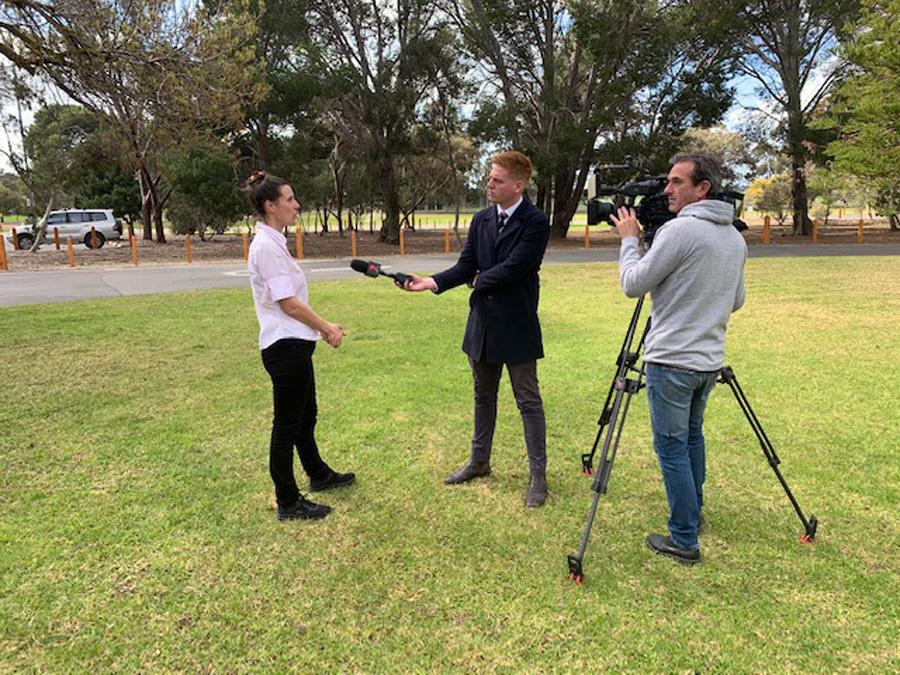Scientists in the news this week: July 31, 2020
University of Adelaide scientists working on a project to train dogs to detect COVID-19 leads the headlines this week.
Here are the stories of our scientists and science graduates in the news, for the week ending July 31, 2020.
Animal and veterinary sciences

Researchers Dr Anne-Lise Chaber and Dr Susan Hazel are working on an international project to train sniffer dogs to detect COVID-19.
Drs Chaber and Hazel are coordinating the Australian arm of this international alliance, with local dogs being made available through organisations in various states.
This project featured extensively in the news across all of the major television and radio channels and newspapers, including front page of *The Advertiser.
Image: Dr Anne-Lise Chaber was interviewed by 7News at Roseworthy campus.
Researchers have found that bacteria in humans that has grown resistant to antibiotics has potentially made its way into wildlife. This finding continued to feature in the news, this week on Infosurhoy. The research team from across Australia included our Dr Wayne Boardman.
Agriculture, food and wine

PhD candidate Alexander Copper (pictured) was featured in Australian & NZ Grapegrower & Winemaker and on Winetitles Media.
Copper discussed the impact of climate change on grape and wine producers and offered a potential solution by using the more drought tolerant grapevines from Cyprus.
Professor Kerry Wilkinson has been working closely with Cassegrain Wines on a project which will look into researching the impact of smoke taint from bushfires on grapes and ways to cope with this in the coming years. This continued to be covered in the news across media channels, this week in The Bunyip and Port Macquarie Express.
Dr Katja Hogendoorn had ongoing news coverage, this week on Good Fruit and Vegetables, discussing the green carpenter bee which has faced a significant increase in the risk of extinction following the bushfires on Kangaroo Island. To help save the species, new nesting stalks are being built for these bees across the Island.
The world-first machine ‘FieldExplorer’ featuring Dr Susie Robinson and Dr Darren Plett make headlines in the news again, this week on Grain Central.
The collaborative project led by Associate Professor Matthew Denton that produced a nitrogen reference manual for the Southern Cropping Region again popped up, this week on Mirage News.
Biological sciences

PhD candidate Tahlia Perry continues to feature in the news, this week on MSN and ABC, discussing echidnas and their mating season.
Also discussed, is the Echidna CSI (Conservation Science Initiative) project which aims to gather important information on how last summer’s bushfires affected these echidnas.
Image: An echidna breeding 'train' can last for several weeks. Credit: Echidna CSI
Vikrant Minhas from the Research Centre for Infectious Diseases is the author of a Conversation article, which highlights research from space flight missions has shown bacteria become more deadly and resilient when exposed to microgravity.
The article continued to gain coverage in the news, this week on International Business Times.
Soil scientist Professor Robert Fitzpatrick continued to be featured across new channels this week for contributing to an expert brief published by The Australian Academy of Science. The brief focused on the crucial need for more work to occur to help Australian soil recover from bushfires.
This was shared in an interview on ABC Radio and ABC Online.
Students and alumni
Science graduate Jacinta Jenkins continued to be featured in the news, this week in Australian & NZ Grapegrower & Winemaker magazine and Winetitles Media for being appointed as senior winemaker at the Balnaves of Coonawarra following the retirement of Pete Bissell.
Wine graduate and Wolf Blass winemaker, Clare Dry, featured in the news on Drinks Trade. Dry discussed the challenges the wine industry faces such as enticing millennial drinkers, and how Wolf Blass is adapting accordingly.
Share your story
If you've featured in the media this week and don't get a mention above, send an email with the details to Rose Fitzmaurice in the Faculty of Sciences Marketing and Student Recruitment team.
